Erstellt am: 10. 11. 2014 - 17:34 Uhr
A Revolution For The People
It has been strange for me these past few days, working for FM4 Reality Check, trying to work out what is going on in Burkina Faso. I went there a few years ago precisely because it was a country that was never in the news, a forgotten land-locked land in the middle of West Africa.
Burkina Faso, meaning “Land of the Upright People” is a mysterious land, hard to decipher, a land of great contrasts, a place that is hardly ever written about. It is, in short, the sort of place that draws the curious (that is to say the nosey) traveller.
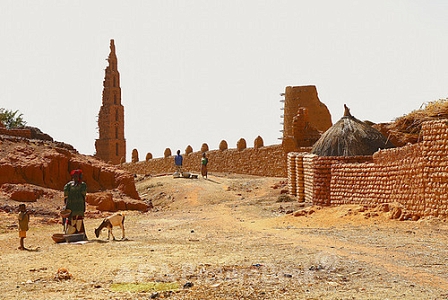
giancarlo majocchi / TIPS / picturedesk.com
"Land Of The Upright People"
I went there and had vivid experiences – visiting the mud and stick mosques, the signature architecture of the Sahel, that look like they have been peppered with arrows in some Red Indian invasion, dancing all night among sweaty, writhing bodies in an open-sided, band-stand disco in the small town from Banfara and being whisked in a rusting bush-taxi through the hot night crammed next to chickens and crushed by a green-robed matriarch.
I spent weeks there, both in its capital Ouagadougou, universally shortened to “Ouaga”, which is teaming with mopeds and low-powered motorbikes, green taxis and the smell of freshly baked baguettes and its rural backwaters, where been-hive shaped rocks, the Domes de Fabedougou, rise out of read earth dotted with apricot trees.
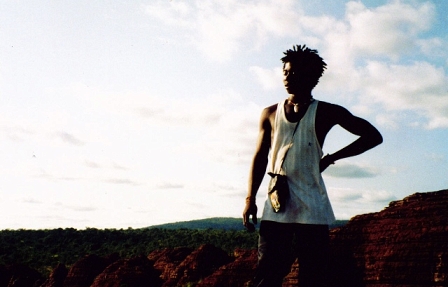
Chris Cummins
And I swore I’d never forget Burkina Faso, its energy, its youthfulness, its intoxicating sense of dignity. But then, like the rest of the world, I forgot about Burkina Faso. Mired in its own poverty, it was newsworthy because it rarely caused problems for everyone else.
Until, in recent weeks, it hit the world headlines for the first time in a generation. A “popular revolution” has ousted president Blaise Compaoré who, with apparent French help, skulked off Cote D’Ivoire with the vacated parliament building in telegenic flames.
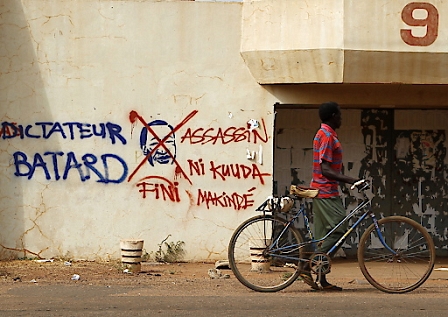
EPA/LEGNAN KOULA
The headline reminded me of watching the black limousines cavalcade of ex-president speed through the dusty, sun-blasted streets of Ouaga, where, just a few years ago, everyone seemed to believe the old autocrat would be in power for ever.
Indeed, since he'd been in power for 27 years in a country where 60 percent of the population is under the age of 25, for a majority of the population he really had been in power for ever. It was hard to envisage a future without him.
I remember being unnerved by the undercurrent of tension in Burkina Faso. Travelling up from relaxed Ghana it was clear that I’d entered an autocracy. Compaoré had come to power in a bloody coup in 1987 and led a west-leaning, IMF-adhering regime ever since. Western powers forgave him his anti-democratic tendencies with a similar moral ambivalence they Show to Hosni Mubarak. But, it seemed to me, the regime's paranoia at home was demonstrated by the frequent document checks on the buses, when silence fell as grim-faced soldiers passed through the aisle. The fear was palpable.
Now Compoaré’s 27 years in power have come to end and he has left behind him a power vacuum in one of the world’s least developed economies in the world. Burkina Faso has an unemployment rate of 77 percent, and a decrepit heath system that sees 166 children in every 1,000 die before reaching the age of five. It’s a volatile situation and it is hard to see the outcome with 34 different groups and parties vying for control, big powers including France, the US and Nigeria pulling strings from afar, the military in control and bickering among itself.
The original people’s power revolutionary symbols of the broom and the wooden millet spatula are pretty much forgotten as the hard, cold and pragmatic politics of security take precedence over the communal will of the people . After the experiences on the south Mediterranean, it is hard to hold out hope for the “African Spring”.
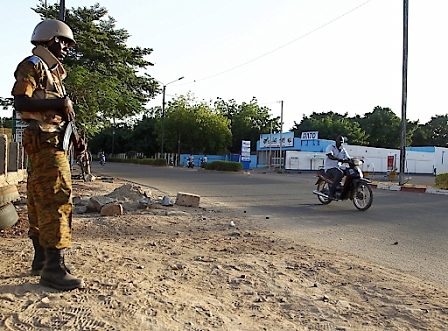
APA/EPA/LEGNAN KOULA
The poverty in Burkina Faso is vivid. When I visited the second city of Bobo-Diouslasso, the backstreets are litter strewn and filthy. A black stream ran through the centre of the residential area, clogged with plastic bags, frothy from detergent and stinking from human faeces. As I wandered around town, I saw an entirely naked man, formidably well-endowed, walked down a busy street without anyone blinking an eye-lid. A holy man? A remote tribal belief? My companion Ismael shrugged. It was unusual enough to comment on. There is a tolerance that is striking for westerners.
The Courtyard Politics
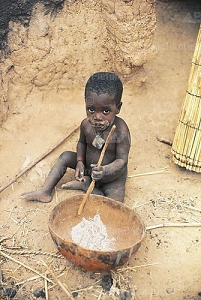
DEA PICTURE LIBRARY / United Archives / picturedesk.com
And there are more surprises: Down a narrow, unhygienic alley in Bobo, Ismael took me through a small door in one of the shabby looking high-yellow walls of the quartier and we entered a new world – a light well-ordered inner courtyard. Ismael’s family were sitting in the shade of mango trees. Two older ladies were weaving baskets and a younger woman, wearing a colourful headscarf was washing clothes in a bucket. Children were playing and a fat man was just sitting slumped in a chair occasionally swatting at flies.
In another corner, Ismael's father and uncle were reading newspapers and grunting to each other about the state of the nation. There is often the air of a Paris salon in urban Burkina Faso. Although more than 29 percent of the population is illiterate, in urban areas there are newspaper stands and booker sellers everywhere. Those who do read seem voracious.
It seems to me that this widespread intellectual air bodes well for a country now charged with defining ist own future. Everywhere I went there was an eagerness to discuss politcs (I became an unwitting and unwilling spokesperson for "The West"). Meanwhile, Ouaga has been the home of the pan-African film festival Fespaco for more than 40 years – showcasing some of the best talent on the continent – a centre for discourse on African affairs.
A Long, Painful Transition?
From afar it’s hard to see how the situation will unfold. It's not going to be smooth. There are so many pressing Problems to overcome and Burkina Faso's perceived role as a geopolitical bolster against the spread of Islamist insurgencies, outsiders are bound to demand their say. Romance is unlikely to feature highly in this "revolution". Removing the old autocrat might be the beginning of a long, painful transition vulnerable to corruption at every step. As Simon Allison writes in the Guardian, “when it comes to improving the lives of average citizens, creating and maintaining political stability and kick-starting stagnant economies, coups and revolutions don’t seem to work all that well.”
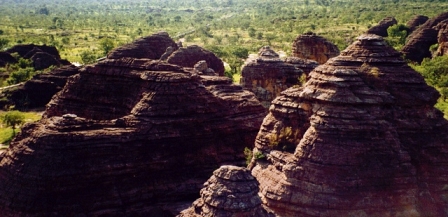
Chris Cummins
Burkina Faso is not a quick stop on the media tour of crisis states but a country of young, often ambitious, men and women with hopes and dreams and they deserve to be better served than they have by Compoaré. As the military and foreign powers try to dictate the future of Burkina Faso, they should remember this was a “revolution” of the ordinary Burkinabe people for the Burkinabe people. And the “powers” should recognise that short term geopolitical “security” is not the only concern – the Burkinabes' participation in choosing their own future should be guaranteed.


